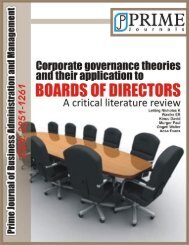303 Prime Research on Education(Course facilitation) as a support service?- How do NOUN students perceive information as a supportservice?- How do students perceive orientation as a supportservice at NOUN?- How do students perceive course registration as asupport service at NOUN?- How do students perceive matriculation as learners‟support service?- How do students perceive counseling as learnerssupport services at NOUN?- How do students perceive Assessment/Evaluation aslearning support service at NOUN?- How do students perceive course materials as learnerssupport service at NOUN?- How do students perceive multimedia as supportservice at NOUN?- How do students perceive support staff as learnerssupport service at NOUN?The research was carried out in 5 of the six regions ofNigeria. A study centre in each of the five regions wasselected and used for the study. The students in theselected centres constituted the subject of the research.The Study is very significant to the National Open Universityof Nigeria (NOUN) in particular, as it highlights thestudents‟ perception of Learners Support Services providedby the University that tend to bridge the gap betweenstudents and course lecturers (coordinators). It will helpthe University to plug loopholes in their support serviceswhich may work against academic progress and theprocess of teaching/learning transaction. In general, thestudy is significant to the Nigerian Education Systemespecially, as far as the Open and Distance EducationPolicy is concerned. It is also helpful to other ODL institutionswhich provide support services to students.Dillon et al., (1992), had examined learner supportsystems in a state-wide instructional televisionprogramme and noted that students listed the followingfactors as hindering their performance in the interactivetelevision courses:- Instructor‟s negative attitude toward off-campusstudents- of instructor contact outside class- Lack of feedback from instructor- Unavailability of library resources- Technical problems related to audio- Lack of training in the use of media for both instructorand students- Poor courier service, (distribution of course materials tosite)- Unruly behavior of students at remote sites.In a study, entitled Students‟ Perception of EffectiveDimension of Interactive Learning in a Blended LearningEnvironment, Delialioglu, Omer and Yildirim (2007),investigated Students‟ Perceptions of the effective dimensionsof interactive learning in a hybrid course. A casestudy design was used and 25 students enrolled incomputer networks and communication, a course at publicuniversity in Turkey, formed the sample of this studywhich lasted for 14 weeks. At the end of the study,interviews were conducted to gather data on effectivedimensions of interactive learning. Additionally, computerlogs of the students were kept and analyzed to triangulatethe interview data. The findings of the studyshowed that the way instructionists and constructivistelements are blended, the need for metacognitive support,authentic learning activities, collaborations, typesand source of motivation individualized learning andaccess to the internet played important roles in studentslearning in hybrid course.In a related study on the students‟ Affective Learningcognition and motivation Baker (2010), using the Instructionpresence scale. Instructor Immediacy Scale (Garham1988), Six-scale measure of Affective Learning (McCroskeyet al, 1985), Learning loss Scale (Richmond et al 1987),and Student Motivation Measure (Christophel, 1990),found out that instructor presence positively impactedstudents affective learning, cognition and motivation. Theimplication of this is that the study provides insights foronline instructors looking for specific indicators toimprove their students learning experiences. According toPicciano (2002), practitioners can establish presence intheir Online learning environment by engaging studentsthrough the methodical design, facilitation and direction ofcourse.As we enter into the information Technology era, thereis rapid advancement in information technology and easyaccess to the internet. Many institutions of higher learningare taking advantage of these phenomena by offeringcomputer-based learning, multimedia assisted learning ordistance learning courses to cater for the students‟needs. As a result, academicians are actively involved inthe development of web-based teaching materials.In a study entitled students‟ Perception of MultimediaComputer mediated learning, Wei, Hoon, Yussof, Naimand Suliman (2005) established that overall rating forMML for both Science and Arts students fall in the rangeof 40% to 50%. The average means score for MML contentand MML system for both streams of students isbelow 3. This means that students generally still prefer aconventional learning style which covers face to facelectures, textbooks and senior notes. They also concludedthat the major problems faced by students in MML isthe slow download time and server being always down.Academic guidance and counseling is emerging as acrucial aspect of students‟ support services especially fordistance education students. However, not all open anddistance learning institutions have organized studentsupport service in a systematic way. Some distancelearning institutions see guidance and counseling as anAmini 304
Table 1: Student‟ Perception of Tutoring (Facilitation) as a Support Service in NOUNNo. of students454Percentage (%)Total ScoresSA AG UD DA SDA4502 5000 1860 2078 24528.3 31.5 11.7 13.1 15.4Total Score for Facilitation15890100This shows a total students‟ perception of 28.3% and 31.5% agreement for the items on facilitation, andlower percentages of 13.1 and 15.4 disagreement.unnecessary service, others offer a little and very fewhave organized it into the system.The current debate on students support services ingeneral and counseling in particular, has now shifted theattention of researchers from questions like “Do distanceeducation students need counseling? And should distanceeducation institutions provide counseling services to itsstudents?” to “what are the counseling needs of distanceeducation students? And what counseling servicesshould a distance education institution provide and how?(Tucker, 2002).Kangai, Rupande, and Rugonye (2011), studiedstudents‟ perception in the Quantity and Effectiveness ofGuidance and counseling services at the ZimbabweOpen University with the primary purpose ofdemonstrating how an open and distance learninginstitution can develop and provide quality and effectiveguidance and counseling services to it students throughthe use of a four-step-model. Data for the study wascollected from a random sample of 200 studentsregistered at ZOU for academic year 2010, through asurvey that employed questionnaire and interviews. Themajor findings of the study were that although ZOU hasinstitutionalized guidance and counseling as a keysupport service for ODL students by setting up studentsupport service unit (SSSU), the majority of the students(80%) of whom live and work in the rural areas, neededquality and effective guidance and counseling andgeneral academic support in the following areas:- Distribution of learning materials- Management of course work (assignment)- Tutorials- Processing of examinations- Communication- Individualized counselingFour hundred and fifty four students from five studycentres scattered in the southwest, southeast,southsouth, northeast and north central regions of Nigeriaconstitute the sample for this study. Sixty-seven 1 st yearstudents from the Port Harcourt centre were speciallyselected to measure perception and academicperformance. The simple random method was used inselecting the centres as well as the students.305 Prime Research on EducationStudents‟ Perception of Learners Support ServicesQuestionnaire (SPLSSQ) was the instrument used fordata collection. The instrument was constructed by theresearcher and given a peer review by colleague toobtain a face validity.The instrument was pilot-tested on fifty students of thePort Harcourt centre in its raw form of 125 items. Thesplit-half reliability was established for the instrument,which stood on the average of 0.6. Thereafter someitems were discarded, and a final 97 items was used forthe study.The instrument is a five-point scale fashioned in theLikert format. The scales include: strongly Agreed (SA),Agreed (AG), undecided (UD), Disagree (DA), andstrongly Disagree (SG).METHODOLOGYData Analysis and ResultsThe data collected for the research is analyzed usingsimple percentages to resolve the research questions,and the t-test analysis to resolve the ten hypotheses onstudents‟ performance. The results are presented in thetables 1 to 10 below:RESULTS, DISCUSSION AND CONCLUSIONA 31.5% agreement on perception of facilitation items onthe SPLSSQ against 13.1% disagreement scores showsthat students see tutorial facilitation as an enhancingsupport service in the National Open University ofNigeria. This result is in agreement with Delialioglu, Omerand Yildirim (2007) who found that the way instructionistsand constructivists elements are blended, the need formetacognitive support, authentic learning activities,collaborations, types and source of motivations, all playimportant roles in students learning. The result is also inagreement with Baker (2010) who established a highstudent perception scores for instructor immediacy andpresence for online students‟ Affective learning, cognitionand motivation. This result has implication on the role offacilitators in the overall performance of distance learningstudents. This is especially so for institutions thatemploys the hybrid mode, for students will always tend todepend of the face-to-face segment of their learning byfacilitation. The National Open University of Nigeriaemploy the hybrid mode with at least 42 study centres


![See Full Article [pdf] - prime journals limited](https://img.yumpu.com/42270022/5/500x640/see-full-article-pdf-prime-journals-limited.jpg)
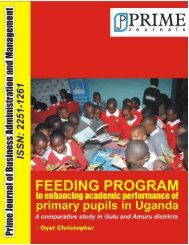

![See Full Article [pdf] - prime journals limited](https://img.yumpu.com/49292987/1/190x245/see-full-article-pdf-prime-journals-limited.jpg?quality=85)
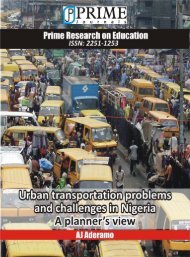

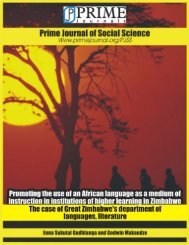
![See Full Article [pdf] - Prime Journals](https://img.yumpu.com/44526114/1/190x245/see-full-article-pdf-prime-journals.jpg?quality=85)


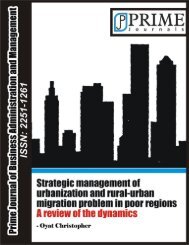
![See Full Article [pdf] - Prime Journals](https://img.yumpu.com/41607332/1/190x245/see-full-article-pdf-prime-journals.jpg?quality=85)
![See Full Article [pdf] - Prime Journals](https://img.yumpu.com/41231982/1/190x245/see-full-article-pdf-prime-journals.jpg?quality=85)
